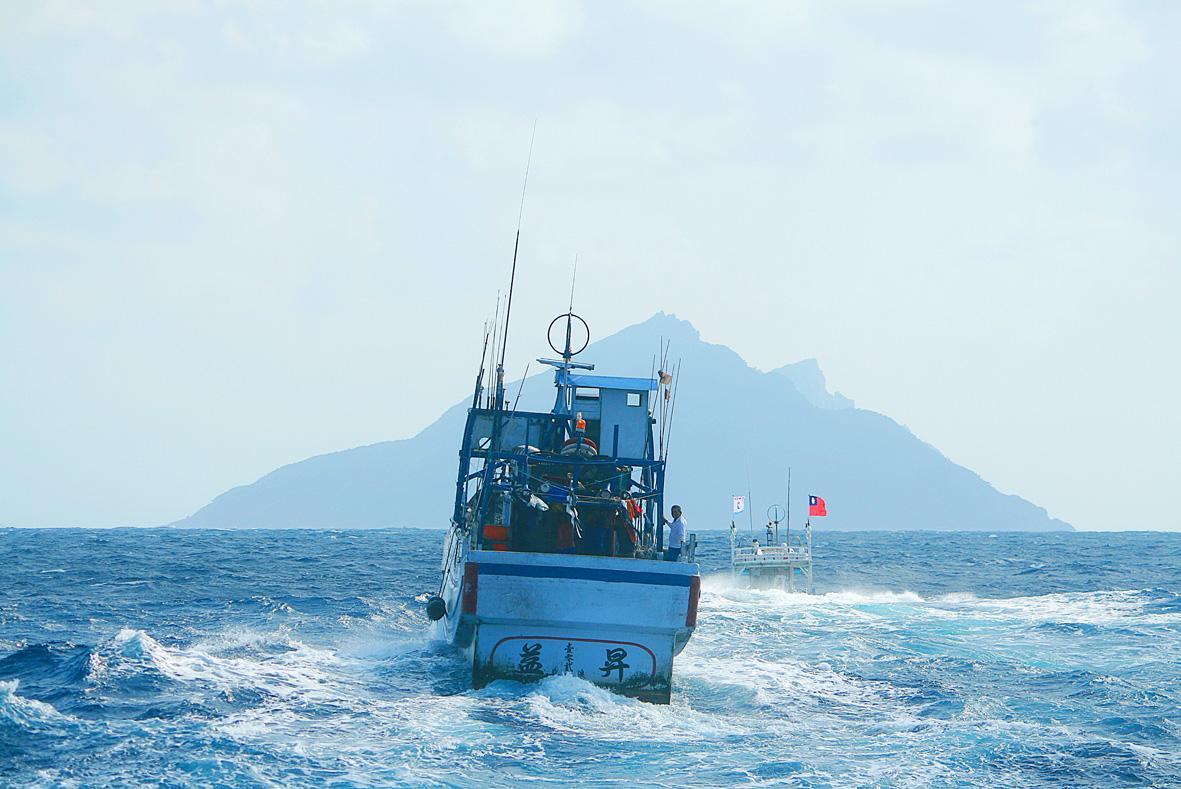Taiwanese fishers’ operations in the East China Sea are still protected under a Taiwan-Japan agreement and remain the same, despite an administrative name change to some islands, the Japan-Taiwan Exchange Association’s office in Taipei said yesterday.
The Ishigaki Municipal Assembly on Monday last week passed a bill to change the administrative name of the Diaoyutai Islands (釣魚台) — known as the Senkaku Islands in Japan — from “Tonoshiro” to “Tonoshiro Senkaku.”
The islands are a group of uninhabited islands in the East China Sea claimed by Taiwan, Japan and China.

Photo courtesy of Li Chung-wei
The rights of Taiwanese fishers are not affected by the Ishigaki council’s name change, association’s spokeswoman Takano Hanae said, describing media reports that their fishing rights have been affected as misleading.
Taiwanese vessels are still entitled to the fishing rights in waters listed in the 2013 Taiwan-Japan Fisheries Agreement, Hanae said, adding that Japan does not want to make any unilateral changes to the “status quo.”
The association hopes to continue deepening Japan-Taiwan cooperation based on the existing platforms, Hanae said, as Taiwan is an important friend of Japan.
In related news, Chinese Nationalist Party (KMT) Chairman Johnny Chiang (江啟臣) yesterday morning canceled a planned afternoon visit to Yilan County to support efforts to reassert Taiwan’s sovereignty over the Diaoyutais, citing a conflict of schedule.

CHAOS: Iranians took to the streets playing celebratory music after reports of Khamenei’s death on Saturday, while mourners also gathered in Tehran yesterday Iranian Supreme Leader Ayatollah Ali Khamenei was killed in a major attack on Iran launched by Israel and the US, throwing the future of the Islamic republic into doubt and raising the risk of regional instability. Iranian state television and the state-run IRNA news agency announced the 86-year-old’s death early yesterday. US President Donald Trump said it gave Iranians their “greatest chance” to “take back” their country. The announcements came after a joint US and Israeli aerial bombardment that targeted Iranian military and governmental sites. Trump said the “heavy and pinpoint bombing” would continue through the week or as long

TRUST: The KMT said it respected the US’ timing and considerations, and hoped it would continue to honor its commitments to helping Taiwan bolster its defenses and deterrence US President Donald Trump is delaying a multibillion-dollar arms sale to Taiwan to ensure his visit to Beijing is successful, a New York Times report said. The weapons sales package has stalled in the US Department of State, the report said, citing US officials it did not identify. The White House has told agencies not to push forward ahead of Trump’s meeting with Chinese President Xi Jinping (習近平), it said. The two last month held a phone call to discuss trade and geopolitical flashpoints ahead of the summit. Xi raised the Taiwan issue and urged the US to handle arms sales to

BIG SPENDERS: Foreign investors bought the most Taiwan equities since 2005, signaling confidence that an AI boom would continue to benefit chipmakers Taiwan Semiconductor Manufacturing Co’s (TSMC, 台積電) market capitalization swelled to US$2 trillion for the first time following a 4.25 percent rally in its American depositary receipts (ADR) overnight, putting the world’s biggest contract chipmaker sixth on the list of the world’s biggest companies by market capitalization, just behind Amazon.com Inc. The site CompaniesMarketcap.com ranked TSMC ahead of Saudi Aramco and Meta Platforms Inc. The Taiwanese company’s ADRs on Tuesday surged to US$385.75 on the New York Stock Exchange, as strong demand for artificial intelligence (AI) applications led to chip supply constraints and boost revenue growth to record-breaking levels. Each TSMC ADR represents

Pro-democracy media tycoon Jimmy Lai’s (黎智英) fraud conviction and prison sentence were yesterday overturned by a Hong Kong court, in a surprise legal decision that comes soon after Lai was jailed for 20 years on a separate national security charge. Judges Jeremy Poon (潘兆初), Anthea Pang (彭寶琴) and Derek Pang (彭偉昌) said in the judgement that they allowed the appeal from Lai, and another defendant in the case, to proceed, as a lower court judge had “erred.” “The Court of Appeal gave them leave to appeal against their conviction, allowed their appeals, quashed the convictions and set aside the sentences,” the judges